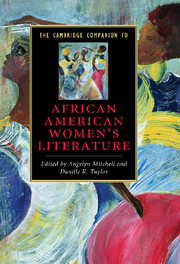Introduction
Published online by Cambridge University Press: 28 July 2009
Summary
When I think of how essentially alone black women have been - alone because of our bodies, over which we have had so little control; alone because the damage done to our men has prevented their closeness and protection; and alone because we have had no one to tell us stories about ourselves; I realize that black women writers are an important and comforting presence in my life. Only they know my story. It is absolutely necessary that they be permitted to discover and interpret the entire range and spectrum of the experience of black women and not be stymied by preconceived conclusions. Because of these writers, there are more choices for black women to make, and there is a larger space in the universe for us.
- Mary Helen WashingtonWhen Lucy Terry composed the first known poem by an African American in 1746, she inaugurated a vital and vibrant literary tradition - African American women's literature. Throughout history, African American women writers have chronicled and critiqued the American experience as did Lucy Terry in the eighteenth century. Once marginalized, if not ignored, by mainstream America, African American women writers are now central, indeed essential, to American letters and culture. If, as Frances Smith Foster asserts, African American women writers have “used the Word as both a tool and a weapon to correct, to create, and to confirm their visions of life as it was and as it could become,” this volume bears witness to “their visions of life” as well as to their artistic goals and achievements. The Cambridge Companion to African American Women's Literature offers critical commentaries on almost three centuries of African American women's writing, spanning from the eighteenth century's Lucy Terry to the twenty-first century's Sapphire.
- Type
- Chapter
- Information
- Publisher: Cambridge University PressPrint publication year: 2009



